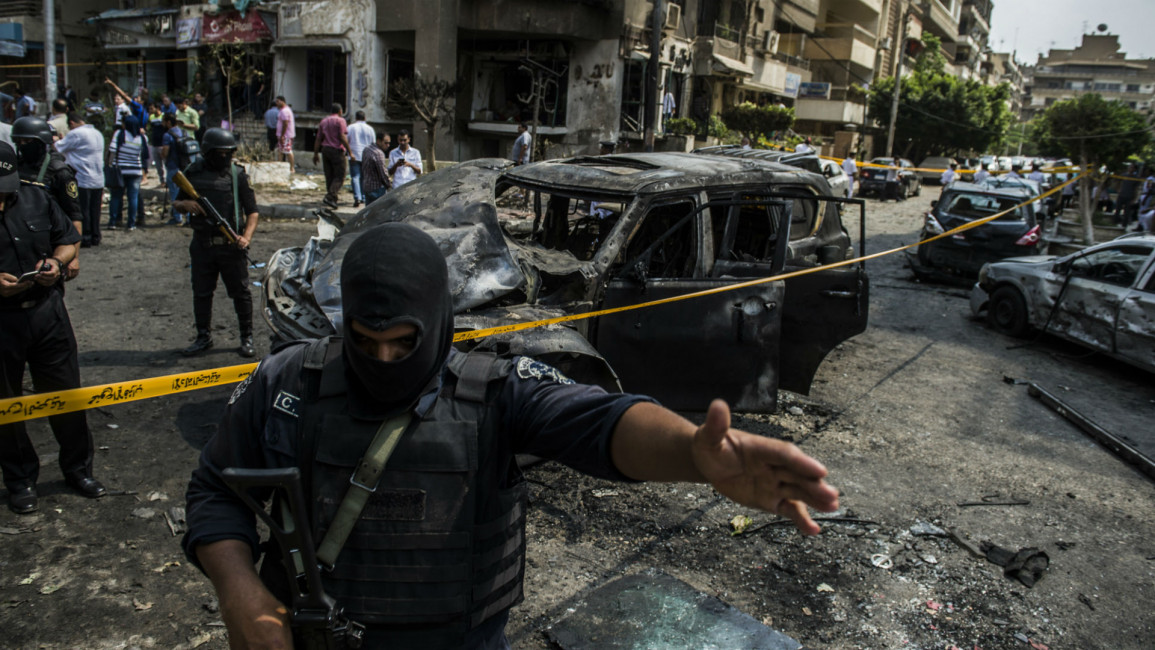
Was the Barakat assassination an inside job?
Was the Barakat assassination an inside job?
Blog: Conspiracy theories - with no supporting evidence - that the Egyptian state was responsible for the killing of the state's top prosecutor have been spreading online.
3 min read
Police stand guard at the scene of the assassination in Cairo [Getty]
No group has yet claimed responsibility for the assassination of Egypt's top prosecutor, Hisham Barakat, in a car bomb at the end of June, but there are plenty of theories floating around - including conspiracy theories that accuse the government itself of being behind the killing.
Many journalists and political commentators opposed to the government of President Abdel Fattah al-Sisi have spoken out in the media and online, saying they believe the former military leader is responsible for Barakat's death.
Al-Jazeera journalist Ahmad Mansour, who was recently detained in Germany on pressure from the Egyptian government, tweeted: "I do not rule out the possibility that the Sisi regime has gotten rid of [Barakat]."
"The regime is trying to find excuses... and also win back the hearts of the people after it turned its back on them," the British-Egyptian dual citizen added.
He theorised that the Egyptian government had possibly milked all it could out of Barakat - and the time had come to replace him with a new prosecutor-general.
No evidence supporting such conjecture is known to exist.
Barakat signed the arrest warrants for more than 40,000 people, and gave the green light for security services to break up protests in Rabaa Square in August 2013.
As many as 1,000 protesters were massacred as that sit-in demonstration was dispersed, leaving no shortage of people seeking vengeance.
A common theme among the conjecture and conspiracies is that the government is seeking to justify the death sentence passed on former President Mohammad Morsi.
After the bombing killed Barakat, Sisi vowed "rapid justice" against imprisoned members of the blacklisted Muslim Brotherhood.
The following day, Egypt passed new anti-terror laws that ruled out the right of appeal for Brotherhood defendants.
Former Minister of Parliament Affairs and law professor Mohamed Mahsoub tweeted: "The bombings and acts of violence always begin whenever popular discontent comes close to overwhelming government oppression and corruption. It is trying to avoid being held accountable by manufacturing a battle."
Political pundit Wael Qandil, tweeted: "If the director of Mossad came out now and admitted to killing the prosecutor-general, the idiots would tell him: 'Don't say that about yourself, sweetie, the Brotherhood killed him.'"
The government has blamed Barakat's assassination on the banned Muslim Brotherhood, although the group has denied any involvement in the killing.
The allegations against the group have led Brotherhood leaders in exile to call for an international investigation into the assassination, as well as the mysterious deaths of nine Brotherhood members in a Cairo flat two days after the bombing.
Many journalists and political commentators opposed to the government of President Abdel Fattah al-Sisi have spoken out in the media and online, saying they believe the former military leader is responsible for Barakat's death.
Al-Jazeera journalist Ahmad Mansour, who was recently detained in Germany on pressure from the Egyptian government, tweeted: "I do not rule out the possibility that the Sisi regime has gotten rid of [Barakat]."
"The regime is trying to find excuses... and also win back the hearts of the people after it turned its back on them," the British-Egyptian dual citizen added.
He theorised that the Egyptian government had possibly milked all it could out of Barakat - and the time had come to replace him with a new prosecutor-general.
No evidence supporting such conjecture is known to exist.
Barakat signed the arrest warrants for more than 40,000 people, and gave the green light for security services to break up protests in Rabaa Square in August 2013.
As many as 1,000 protesters were massacred as that sit-in demonstration was dispersed, leaving no shortage of people seeking vengeance.
|
The bombings and acts of violence always begin whenever popular discontent comes close to overwhelming government oppression and corruption - Mohamed Mahsoub |
A common theme among the conjecture and conspiracies is that the government is seeking to justify the death sentence passed on former President Mohammad Morsi.
After the bombing killed Barakat, Sisi vowed "rapid justice" against imprisoned members of the blacklisted Muslim Brotherhood.
The following day, Egypt passed new anti-terror laws that ruled out the right of appeal for Brotherhood defendants.
Former Minister of Parliament Affairs and law professor Mohamed Mahsoub tweeted: "The bombings and acts of violence always begin whenever popular discontent comes close to overwhelming government oppression and corruption. It is trying to avoid being held accountable by manufacturing a battle."
Political pundit Wael Qandil, tweeted: "If the director of Mossad came out now and admitted to killing the prosecutor-general, the idiots would tell him: 'Don't say that about yourself, sweetie, the Brotherhood killed him.'"
The government has blamed Barakat's assassination on the banned Muslim Brotherhood, although the group has denied any involvement in the killing.
The allegations against the group have led Brotherhood leaders in exile to call for an international investigation into the assassination, as well as the mysterious deaths of nine Brotherhood members in a Cairo flat two days after the bombing.




